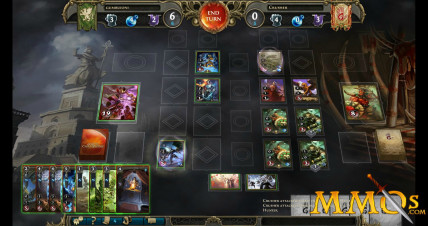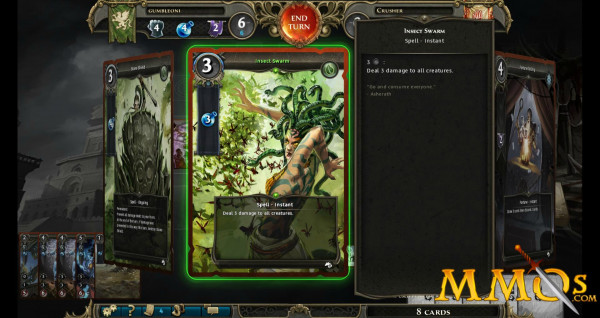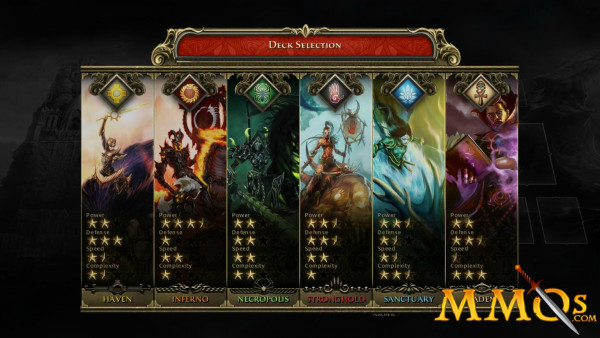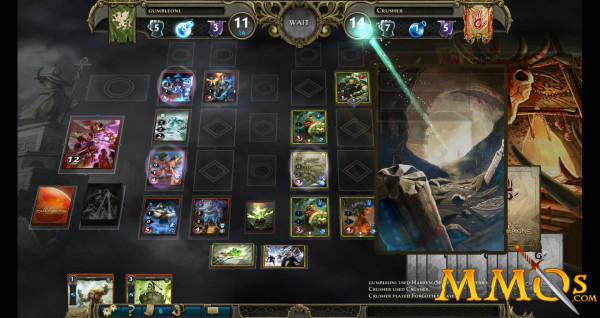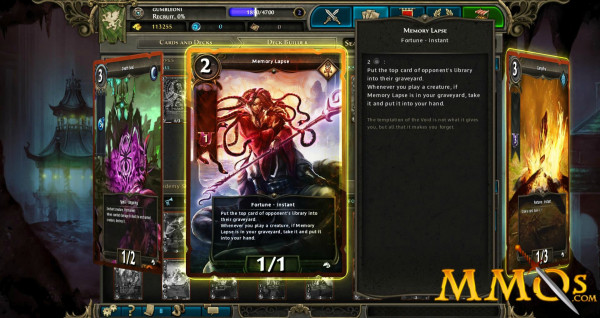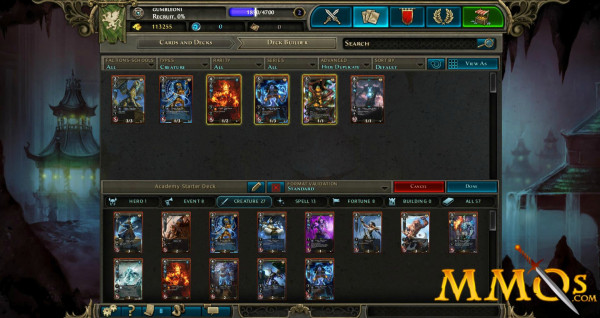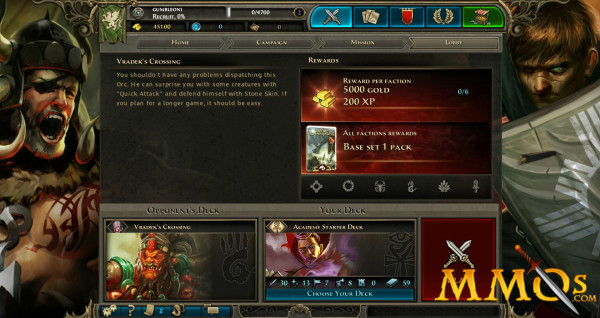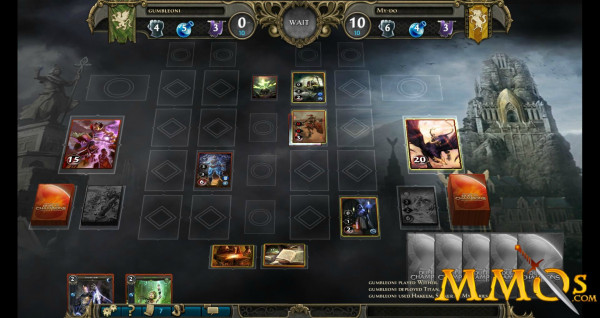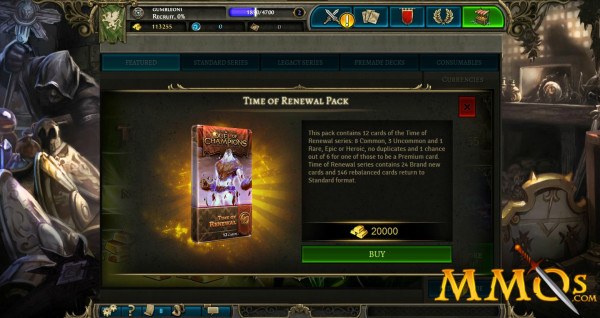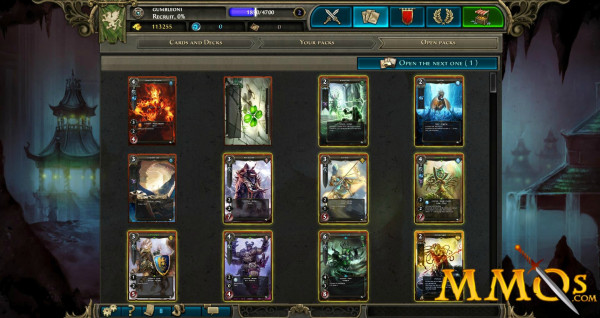Might and Magic: Duel of Champions
Might and Magic: Duel of Champions is a competitive collectible card game with more than 770 cards to collect and use in battle. Hone your skills in the single-player campaign and compete in tournaments using creatures, spells, and custom decks to seize victory.
| Publisher: Ubisoft Playerbase: Low Type: CCG Release Date: August 10, 2012 Shut Down: October 31, 2016 Pros: +Big card library. +Extensive deck customization. +Robust campaign. Cons: -Limited graphic settings. -No move timer in PvP. -Pay-to-win elements. -No planned Android support. |
Might and Magic: Duel of Champions Overview
Might and Magic: Duel of Champions is a trading card game where players collect cards and build a deck to defeat enemies in the campaign and PvP to rise to the top of the leaderboards. Collect over 770 cards and craft a deck that suits your own playstyle with an easy-to-use deck management tool. Cast spells, deploy creatures, and tactically maneuver your cards to gain the upper-hand in battle. There are 6 factions to choose from, each with their own distinctive style and deployable cards. Rip through the campaign, defeating goblins, pirates and more, earning gold and experience as you win. Use gold to purchase new booster packs, unlocking new cards and expanding your possible deck combinations. Test your skills in the PvP arena, either through exhibition matches or play ranked and see how well you fare against other players. Two tournament styles let players compete head to head for prizes and glory. Build the perfect deck and dominate the arenas in Might and Magic: Duel of Champions. The game shut down on October 31, 2016.
Might and Magic: Duel of Champions Key Features:
- Six factions - choose from six elemental factions, each with their own distinct style.
- Campaign - learn the game’s mechanics and test your decks against a variety of AI in an extensive campaign.
- Deck Customization - craft a deck that suits your playstyle, with up to 209 cards in one deck, to form a strategy that works for you.
- Tournaments - two tournament styles let you test your luck against other players for gold and glory.
- Tactical Deployment - position your cards optimally on a 16 slot battleground, constantly negotiating your opponents’ moves to dish out maximum damage.
Might and Magic: Duel of Champions Screenshots
no images were found
Might and Magic: Duel of Champions Featured Video
Might and Magic: Duel of Champions Review
By, Sean Sullivan
I’ve played more than few trading card game’s recently, and I expected more or less the same paradigms to guide Might and Magic: Duel of Champions. While Ubisoft’s addition to the TCG market does follow similar formulas it distinguishes itself through lane-based combat on a 16-slot grid battlefield. Matches are fluid bouts, that don’t waste your time with extravagant animations but enforce quick, tactical decisions. While it isn’t as skill-demanding as Magic: The Gathering, Might and Magic: Duel of Champions is an enjoyable free-to-play title that stands out among its competitors.
Gameplay
Divided into two halves, the battlefield is a horizontal arena with players staring down their enemies from the left-side of their screen. Upon the beginning of each turn both combatants earn resource points to spend on playing cards, whether they be creatures, spells, or fortunes. But to play cards you must also raise your Hero card’s stats: Might, Magic, and Destiny (spells), with each card demanding a particular amount of resources. While there are numerous tokens to monitor, it plays out intuitively. The tutorial does an excellent job of elucidating each mechanic and I never felt overwhelmed or lost. Combat is just as simple as resource management.
Creatures can only attack other targets in their row; they’re confined to their battle hallways. So, part of the game’s strategy is making sure you have each of your four hallways protected by a creature. Without a creature guarding the row, your hero is open to attack, and once all 20 of your health is eviscerated, you lose. Anytime two cards clash, the attacker dishes out their attack damage, while the defendant counters, dishing out damage equal to their retaliation points. Knowing when to attack and focus on defense is equally important to victory.
Cards can only perform one action per turn, including both attacking and movement. Sometimes moving a card is your best action. My Nethermancer was blocked by a Bramble Beast. Reshuffling his position to enable an assault on the enemy hero activated Nethermancers ability, forcing my goblin opponent to put the top 3 cards of his library into the graveyard. Slotting your cards properly will mean the difference between chipping away at an opponents’ health and watching your cards relegated to the graveyard.
Aesthetics
Combat sequences are not individually animated and every attack is the same motion: a kid picking up his card and slamming it on top of his opponents’ to indicate an attack. While not glamorous it’s a smooth sequence that moves along at a rapid pace, keeping the game engaging by foregoing special effects downtime. It makes for a fast card game, the digital TCG form of blitz chess, and a smooth polish that’s consistently fluid. While cards aren’t individually animated, they’re art is intricate and engaging drawings. Many of them do feel like close-up poses (Boris Vallejo artwork), and don’t evoke the sense of action reserved to Magic: The Gathering artwork. Nonetheless, they are aesthetically enjoyable and each new card I encountered felt uniquely inspired. And the operatic music sets the stage for epic battles, a religious fervor that excites you to lay your cards on the table in a duel of destiny.
Deck Selection
After completing the tutorial you’ll be prompted to choose between one of 6 decks, each presented with 4 attributes: Power, Defense, Speed, and Complexity. As a new player you’re not familiar enough with the game to make an educated decision, so my reasoning became, “Which of these decks has the coolest looking art?” I settled on Academy, represented by a bewildered Dr.Strange-esque sorcerer who just spotted a stain on his carpet. You’re not obligated to a deck once chosen. The game prompts you to try the deck in a match before committing.
And the extensive deck builder lets you customize your loadout, but what types of cards you can use is dependent on your starting hero. A hero deck with Hakeem, Seeker of Mysteries can only add magic cards. And I can’t construct a new elemental deck until I’ve acquired another Hero card. I tried constructing a personalized deck and learned a lesson along the way. While you could have up to 209 cards in a deck it’s better to be as close to the minimum of 59 as possible to give your deck more predictability. You want to develop a strategy around the cards you expect to draw, and not be forced to alter your tactics.
Campaign
Story mode is a great way to learn the game, setting you up against a seemingly endless onslaught of enemies. The earlier stages were drawn out, probably due to the composition of my magical deck and my lack of substantial cards. Goblin enemies put up formidable defenses that prevented me from attacking, and I was forced to patiently await the end of fifteen turns for my victory to reign. It’s not a bad way to habituate to the game’s elements, as the drawn out, easy matches let you experiment with your deck and test spells and card combinations. And because gameplay is fast-moving my eyes were never drawn to the clock, or busy perusing YouTube.
But once you finish the campaign there’s no more AI to challenge. It’s a disappointment because challenging AI serves as a great dummy target, and can sometimes be more rewarding to defeat than other players. The developers don’t understand that not every person who plays a game is interested in PvP.
PvP
PvP quick matches are divided into two spheres: ranked and unranked. I loitered in unranked matches, versing fellow newbies with starter decks who often took their time. The problem with humans is that their not optimized algorithms, so the pace of gameplay drops dramatically. I typed away this review while waiting for my opponents’ turn. And there’s no evident timer to motivate players to action, so theoretically a match could be stalled by an optimistic narcoleptic. Not that I ever faced much of an issue with players taking their time, but I did ultimately prefer the company of hurried AI over humans.
Ranked matches are serious business, with leaderboards declaring top players for all eyes to seethe with jealousy. And frequent tournaments let players test their deck-creation skills. Swiss Tournaments require a Tournament Ticket, (purchasable in the Shop) and pits players in an 8-player ladder style competition. Whereas the Jackpot Tournament is a free for all based on matchmaking, where accumulated gold is divided among the top players at the end of the tourney. But, ultimately, to be competitive, you will have to invest money into the game.
Cash Shop
TCG’s always have the most straightforward cash shops, because buying cards is already a familiar experience for anyone who's played card games. There are two currencies: gold and seals. Gold is earned by completing matches while seals are the premium currency exchanged for cash. Seals are useful, as they can buy bigger packs of cards, or card box sets, but everything can be purchased strictly using gold.
I purchased half a dozen Time of Renewal card packs for 20,000 gold apiece, a fairly reasonable price considering I had accumulated over 100,000 gold after only a few matches. Opening card packs is part of the fun of purchasing them. I opened hundreds of Pokemon cards searching for the elusive holographic Charizard. Not foregoing disappointment, opening card packs in Might and Magic revived my nostalgia, as I was met with recurring disappointments at not receiving many usable cards. But my desire to accumulate more gold was only reinvigorated, and I quickly headed back to the campaign to buy future packs.
But because you’re only allotted so many cards per pack there is a reasonable assumption that the game is pay-to-win. With an infinite amount of cash I could buy booster packs until I had every card in the game and then form the ultimate deck to crush other players. It’s an unfortunate reality of card games. And while you do earn gold, it’s at a rather slow pace. Even when you do have enough money you’re left to theRNG gods to reward you with a useful card that fits your hero type. It’s an issue that exists with any card game, whether it be in a digital atmosphere or in reality. The kid who has unlimited access to his parents’ credit card is paying to win Magic: The Gathering tournaments at the back of the comic book shop (although she would still need a level of skill to utilize the cards properly).
Beyond purchasing new starter packs you can activate a Gold Boost and XP Boost, temporarily increasing allocated rewards. They’re only necessary if you’re impatient, or have the cash to burn.
Final Verdict - Great
Might and Magic: Duel of Champions is a great TCG with fluid gameplay, a big library of cards, and simple mechanics. It’s lane-stylized gameplay differentiates itself from competitors like Magic Duels, Hex, and Infinity Wars. The campaign eases you into the mechanics, with a variety of decks to combat, forcing you to develop strategy. And deck customization is a simple drag-and-drop system. But, as is usual, the competitive scene is limited to those who dedicate their time to the game, like a full-time job, or invest heavily into purchasing cards. Still, Might and Magic: Duel of Champions is a solid casual TCG, with interesting elements that deserve to be enjoyed.
Might and Magic: Duel of Champions Videos
Might and Magic: Duel of Champions Links
Might and Magic: Duel of Champions Official Site
Might and Magic: Duel of Champions Steam Page
Might and Magic: Duel of Champions iTunes Store
Might and Magic: Duel of Champions Reddit
Might and Magic: Duel of Champions Gamepedia [Database/Guides]
Might and Magic: Duel of Champions Wiki [Database/Guides]
Might and Magic: Duel of Champions System Requirements
Minimum Requirements:
Operating System: Windows XP, Windows Vista, or Windows 7
CPU: Pentium 4 2.4GHz or Sempron 2400+
Video Card: GeForce 210 or Radeon X600 Series
RAM: 1GB
Hard Disk Space: 1 GB
Recommended Requirements:
Operating System: Windows XP, Windows Vista, or Windows 7
CPU: Core 2 Duo E4600 2.4GHz or Athlon 64 X2 Dual Core 5400+
Video Card: GeForce GT 230 or Radeon HD 6550D
RAM: 2GB
Hard Disk Space: 1 GB
Might and Magic: Duel of Champions is available for iPads.
Might and Magic: Duel of Champions Music & Soundtrack
Might and Magic: Duel of Champions Additional Information
Developer(s): Blue Byte
Publisher(s): Ubisoft
Lead Writer: Kurt McClung
Release Date: August 10, 2012
Steam Release Date: November 07, 2013
Shut Down: October 31, 2016
Other Platforms: iPad
Development History / Background:
Might and Magic: Duel of Champions is developed by German based video game company Blue Byte. Founded in 1988, Blue Byte is famous for creating titles such as Battle Isle and The Settlers. In 2001 the company was purchased by Ubisoft. Might and Magic Duel of Champions was released on August 10, 2012, with a subsequent Steam release on November 07, 2013. Blue Byte is also responsible for the Anno series of games, including Anno Online. Might and Magic: Duel of Champions shut down on October 31, 2016. It was never able to compete with heavyweights like Hearthstone and Shadowverse.
